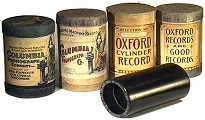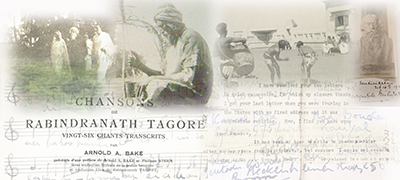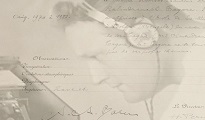Santiniketan and Others
In the thesis I have written about ‘Santiniketan and Others’ as two chapters—’Santiniketan and Others: Coming to Know’ and ‘Santiniketan and Others: An Archive of Archives’. My idea is that the two will be read in a flow. Here I am breaking up the chapter into eleven sub-chapters, on the many people Arnold Bake recorded in and around Santiniketan. They were either students or teachers of the Santiniketan asram, or Bake made recordings in melas (fairs/festivals) around Santiniketan. Sometimes he recorded the itinerant singer passing by his house. From these recordings I have gone into the most eclectic worlds of song-making and listening. The recordings will speak for themselves. We will see how layered and complex the social world of Santiniketan and the world around Santiniketan was at the time. We will see that remembrance is a social and cultural thing—not everyone remembers their ancestors in the same way, not everyone has the same relationship with the past. Sometimes there is no past to remember, sometimes none to remember the past.
Savitri Govind, who later became the famous Rabindrasangit singer Savitri Krishnan, was 18 when Arnold Bake recorded her in Santiniketan in 1931.
Pinakin Keshavlal Trivedi was a Gujarati student in Santiniketan whom Arnold Bake had recorded in 1931. I met his son, Devkumar Trivedi, in Delhi in 2019.
G. Mapara was a 20-year-old Marathi student of Visva-Bharati, from Mahad in the Konkan region. He sang a lavani and a palna or cradle songs, and a Marathi composition in Raag Bihag. Poona-based singer Shruthi Vishwanath sang two palnas in response…
The Berlin Phonogramm-Archiv catalogue describes Ranjan Shaha as Bettelnder Berufssänger, which suggests an itinerant singer who lives by madhukori or collecting alms. Ranjan Shaha was a honey-gatherer.
This was the materialisation of that trip to the festival of the bauls that Arnold Bake had been planning with Kshitimohan Sen ever since he came to Santiniketan for the first time in 1925. In 1932, his companion was not Kshitimohan however, but his trip with Corrie and others was facilitated by the District Magistrate, Gurusaday Dutt…
Kusum is described as a Bhumij woman, who sings a ‘jumur’ or jhumur, the most popular form of music of Purulia, Bankura and parts of Jharkhand. Bake recorded her in Kenduli on 16 January 1932. There is also a film of her singing and dancing, with her drummer partner.
Imam Bux Boyati and his team, jarigan singers from Atharobari, Mymensingh, were recorded on 23 February 1932 at the Suri Mela, Suri, district headquarters of Birbhum. They were recorded twice, on film in 1931 and then on wax cylinders, Bake India II/112-17 the next year. It was Gurusaday Dutt, the district magistrate who organised the festival.
From Gurudayal Malik to Mohan Singh Khangura and Madangopal Singh (orange)
Gurudayal Malik (1896-1970), from Karachi, taught English to school students in Visva Bharati. Between 10-17 April 1933, Arnold Bake recorded him in the asram; he sang four mystical songs in Punjabi and Urdu.
It began with a photograph. Jaya Tagore, grand-daughter of Satyendranath Tagore, with Kuladaprasad alias Motru Sen, her husband, from 1928 or so. From there to two cassettes full of Tagore’s songs recorded in 1964 by Motru Sen, unknown singer but most gifted—it was another rich world of sound, image and story which I was led into.
Laksmisvar Sinha had come to Santiniketan from Rarishal in Habiganj, Sylhet, now in Bangladesh. He was an explorer at heart who travelled to many lands and later became and a practising Esperantist, yet he remained rooted to his soil through his songs. I went looking for him in many places and found much more than this little archive can hold.
All that we get from the catalogue of Arnold Bake’s cylinders is that on 19 August 1933, he recorded a ‘Song of labour’ of some ‘Baori women working on the roof of the post office’, in Santiniketan. Their names, age and where they came from remains unrecorded.



